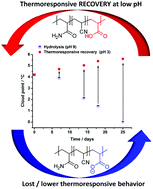News
New Paper: pH dependent thermoresponsive behavior of acrylamide–acrylonitrile UCST-type copolymers in aqueous media
12.02.2016
pH dependent thermoresponsive behavior of acrylamide–acrylonitrile UCST-type copolymers in aqueous media
Beatriz A. Pineda-Contreras, Holger Schmalz, Seema Agarwal Polym. Chem., 2016,7, 1979-1986.

There are only a few non-ionic polymers known for showing thermoresponsivity of UCST-type. Copolymers of acrylamide (AAm) and acrylonitrile (AN) represent one of such thermoresponsive polymers. The present work shows pH-dependent UCST-transitions of this copolymer system. Herein, systematic studies were carried out to show hydrolytic stability and retention of UCST of the copolymer under various conditions. Regeneration of lost UCST-type transitions under extreme pH conditions could be achieved by changing pH, and by addition of electrolytes. Reversible addition fragmentation chain transfer (RAFT) was employed as a tool to synthesize copolymers of AAm and AN. Hydrolysis reactions were carried out intentionally under acidic and alkaline conditions, in order to analyze the chemical stability of the synthesized copolymers as well as to introduce carboxylic groups into the polymer structure. The obtained results showed high tolerance of poly(AAm-co-AN) samples under acidic conditions even after long periods of storage (25 days at pH 3) or after use of pH 0 and increased temperatures (40 °C). In the case of base catalyzed hydrolysis, the thermoresponsive behavior was significantly influenced during hydrolysis in buffer solution of pH 9. Loss and regeneration of the phase transition temperature of these copolymers could be achieved by changing the pH from basic to acidic. Meanwhile, hydrolysis at pH 14 at 40 °C influenced the thermoresponsive behavior and the chemical stability of the polymer, increasing the phase transition temperature over 30 °C. Further, we observed that additives, e.g. formamide can act as a sacrificial agent for providing stable UCST-type transitions even under alkaline conditions as well as at high temperatures (85 °C).

